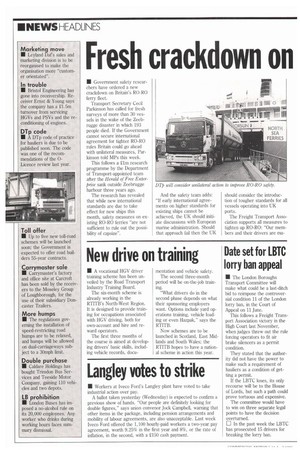Fresh crackdown on Ro-Ro ferries
Page 6

Page 7

If you've noticed an error in this article please click here to report it so we can fix it.
• Government safety researchers have ordered a new crackdown on Britain's RO-RO ferry fleet. Transport Secretary Cecil Parkinson has called for fresh surveys of more than 30 vessels in the wake of the Zeebrugge disaster in which 193 people died. If the Government cannot secure international agreement for tighter RO-RO rules Britain could go ahead with unilateral measures, Parkinson told MPs this week.
This follows a Lim research programme by the Department of Transport-appointed team after the Herald of Free Enterprise sank outside Zeebrugge harbour three years ago.
The research has revealed that while new international standards are due to take effect for new ships this month, safety measures on existing RO-RO ferries "are not sufficient to rule out the possibility of capsize". And the safety team adds: "If early international agreements on higher standards for existing ships cannot be achieved, the UK should initiate discussions with European marine administration. Should that approach fail then the UK should consider the introduction of tougher standards for all vessels operating into UK ports. The Freight Transport Association supports all measures to tighten up RO-RO: "Our members and their drivers are ma jor users of RO-ROs throughout the year, including bad weather seasons," says international manager Dave Green. "Safety is of paramount concern and we support wholeheartedly all genuine and necessary safety improvement measures for the ferries and their operations."
P&O European Ferries welcomes the report, particularly because it highlights areas needing further investigation for safety improvement. Ian Rycroft of Poole-based EC Transport, 70% of whose business is international operations, is deeply concerned over the design of RO-RO ferries: "We're told that Britishregistered RO-RO ferries are the safest in the world, but at the end of the day, you're still putting your truck on a large box which can be breached at the sides, at the end or underneath. It doesn't have to take in a great amount of water before it tips over. One alternative is to compartmentalise the vehicle area but shipowners could argue that negates the benefits of quick loading and unloading. The question is, can government impose its will on shipowners at home and abroad?"
















































































































































